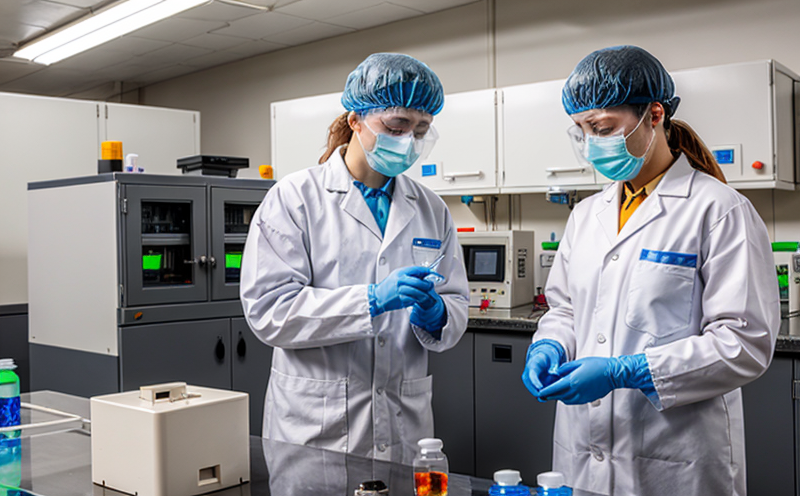EN 18597 Acrylamide Analysis in Roasted Coffee
The European standard EN 18597 provides a method for determining acrylamide content in roasted coffee. This analysis is crucial for food and feed testing as it ensures compliance with regulatory limits set by authorities like the Food and Agriculture Organization (FAO) and the World Health Organization (WHO).
Acrylamide, a probable human carcinogen, can form during high-temperature processing of certain foods. In roasted coffee, acrylamide is primarily produced through the Maillard reaction, which occurs between amino acids and reducing sugars at elevated temperatures. Understanding and monitoring acrylamide levels in processed food products like coffee helps manufacturers adhere to health and safety regulations while maintaining product quality.
Compliance with EN 18597 involves several steps that ensure accurate measurement of acrylamide content, including sample preparation, extraction techniques, and detection methods. Samples are typically prepared by grinding roasted coffee beans into a fine powder. Extraction processes then use solvents to release acrylamide from the matrix for further analysis.
Once extracted, acrylamide is analyzed using liquid chromatography coupled with mass spectrometry (LC-MS/MS), which offers high sensitivity and selectivity necessary for detecting trace amounts of this compound. This method ensures precise quantification, allowing laboratories to report results within the required precision limits specified in EN 18597.
The standard also defines acceptance criteria based on maximum allowable levels of acrylamide in roasted coffee products. Compliance with these thresholds is essential for maintaining consumer trust and ensuring adherence to international standards such as those set forth by the European Union (EU).
For food manufacturers, conducting regular analyses according to EN 18597 not only helps maintain product safety but also enhances brand reputation by demonstrating commitment to quality assurance. Additionally, this testing supports ongoing research into minimizing acrylamide formation during coffee roasting processes.
In summary, implementing EN 18597 provides a robust framework for assessing acrylamide levels in roasted coffee, ensuring both regulatory compliance and consumer safety. By leveraging advanced analytical techniques like LC-MS/MS, laboratories can deliver accurate results that contribute significantly to the broader goal of reducing potential health risks associated with processed foods.
Benefits
Implementing EN 18597 acrylamide analysis in roasted coffee offers numerous advantages for food and feed producers:
- Compliance Assurance: Ensures strict adherence to EU regulations regarding maximum allowable levels of acrylamide.
- Risk Management: Identifies potential hazards early, enabling proactive measures to mitigate risks associated with processed foods.
- Enhanced Consumer Trust: Demonstrates a commitment to product safety and quality, enhancing brand image and customer confidence.
- Ongoing Improvement: Facilitates continuous monitoring of acrylamide levels, supporting ongoing efforts to refine production processes.
- Scientific Insights: Provides valuable data for research aimed at reducing acrylamide formation in coffee and other foods.
Why Choose This Test
Selecting EN 18597 acrylamide analysis is advantageous because it aligns with global standards designed to protect public health. Compliance with this standard ensures that roasted coffee meets stringent quality and safety requirements set by regulatory bodies worldwide.
By choosing our laboratory for this testing, you gain access to state-of-the-art equipment and experienced professionals who specialize in food and feed analysis. Our team understands the nuances of acrylamide formation in processed foods and can provide reliable results tailored specifically to your needs.
We offer a comprehensive suite of services that go beyond just providing analytical data; we also offer expert advice on best practices for minimizing acrylamide levels during coffee roasting. This holistic approach helps you stay ahead of regulatory changes and industry trends while maintaining top-notch product quality.
Use Cases and Application Examples
In addition to its role in ensuring compliance with EU regulations, EN 18597 acrylamide analysis plays a vital part in various applications within the food industry:
- Quality Control: Regular testing helps maintain consistent product quality across batches.
- R&D Projects: Researchers can use this test to explore new methods of reducing acrylamide formation during processing.
- Supply Chain Management: Suppliers and purchasers benefit from verified data that supports informed decision-making throughout the supply chain.
- Regulatory Compliance: Manufacturers ensure they meet all necessary standards before releasing products to market.





